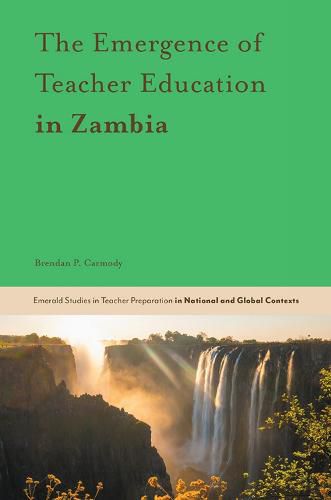Readings Newsletter
Become a Readings Member to make your shopping experience even easier.
Sign in or sign up for free!
You’re not far away from qualifying for FREE standard shipping within Australia
You’ve qualified for FREE standard shipping within Australia
The cart is loading…






This historical narrative focuses on the emergence of teacher education in Zambia. Providing archival material, diverse interpretations, local voices through interview and email, it engages the reader in a complex recipe of viewpoints. It rehearses how teacher education developed from a form of apprenticeship in remote villages to the more centralized ‘normal school’ in colonial times through to colleges with nationwide catchment and more recently to university accreditation. Schooling as an avenue to social mobility and nation building, the challenges of student centred-learning and the development of teachers as professionals are central themes throughout the text. Also analysed is the nature of education offered at different times and how the teacher and his/her education reflect this, arguing the need for a fundamentally new philosophy of education and a mode of teacher formation in line with it.
This book will be an invaluable tool for undergraduate and postgraduate education students, researchers, and practitioners alike, both within and beyond the Zambian and African contexts. It provides rich historical data from which policy makers, historians, and teaching professionals can explore the re-conceptualisation of the role of the teacher as professional rather than as civil servant. Designed to stimulate critical discussion so as to enhance understanding of what effective teaching and teacher education entail and framed by long-term first-hand experience of teacher education in Zambia.
$9.00 standard shipping within Australia
FREE standard shipping within Australia for orders over $100.00
Express & International shipping calculated at checkout
This historical narrative focuses on the emergence of teacher education in Zambia. Providing archival material, diverse interpretations, local voices through interview and email, it engages the reader in a complex recipe of viewpoints. It rehearses how teacher education developed from a form of apprenticeship in remote villages to the more centralized ‘normal school’ in colonial times through to colleges with nationwide catchment and more recently to university accreditation. Schooling as an avenue to social mobility and nation building, the challenges of student centred-learning and the development of teachers as professionals are central themes throughout the text. Also analysed is the nature of education offered at different times and how the teacher and his/her education reflect this, arguing the need for a fundamentally new philosophy of education and a mode of teacher formation in line with it.
This book will be an invaluable tool for undergraduate and postgraduate education students, researchers, and practitioners alike, both within and beyond the Zambian and African contexts. It provides rich historical data from which policy makers, historians, and teaching professionals can explore the re-conceptualisation of the role of the teacher as professional rather than as civil servant. Designed to stimulate critical discussion so as to enhance understanding of what effective teaching and teacher education entail and framed by long-term first-hand experience of teacher education in Zambia.